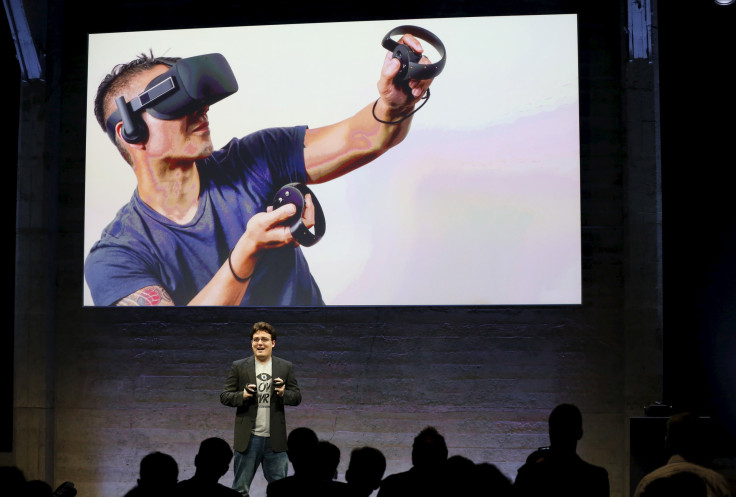Few recent product launches have generated the kind of genuine grassroots enthusiasm that accompanied yesterday’s opening of orders for the long-awaited Oculus Rift. From its initial Kickstarter campaign in 2012, through its announcement earlier this week that backers who participated in that drive would get free Rifts, the company has been a star of the gaming and game-development community, generating so much goodwill and popular support that even its 2014 acquisition by Facebook for $2 billion barely put a dent in its aura.
That started to change yesterday morning, when the company announced the price for the Rift: $599.
Within minutes of the announcement, a firestorm erupted across the internet, as previously loyal fans screamed that the price was too high — and worse, that it was a betrayal of the very values that had made Oculus a success.
Oculus founder Palmer Luckey took to Twitter, Reddit and other channels to defend the price, declaring that, even at $599, the company was “not making any money” on the Rift hardware, and that the price was “obscenely cheap.” Later, Luckey admitted that the company — and he personally — had “handled the messaging poorly.”
To reiterate, we are not making money on Rift hardware. High end VR is expensive, but Rift is obscenely cheap for what it is.
— Palmer Luckey (@PalmerLuckey) January 6, 2016In defending the price — and the messaging — Luckey pointed out that Oculus had previously stated that the total cost of an Oculus-powered system, including a PC and the headset, would be around $1,500. That had led some to assume that the Rift would be about $500, based on the idea that a gaming computer capable of working with the Rift would go for around $1,000. Luckey also admitted that he may have inadvertently misled customers when he commented last year that the Rift would cost “roughly in that $350 ballpark, but it will cost more than that.” Given that Rift prototypes, including the one featured in the original Kickstarter campaign, had sold for as little as $300, the “ballpark” for some was more like $400, rather than $600.
Luckey also pointed out, accurately, that new technology is often expensive when it first comes out, and that the Rift’s price puts it in the same range as an unsubsidized smartphone or mid-range HDTV. He also reminded critics that the company has already released a lower-end product for casual VR users: The Samsung-produced Gear VR, which sells for $99.
At the same time as the pre-order launch, Oculus also announced that it would soon begin selling bundles including a Rift and a gaming PC, at prices starting at around $1,500, precisely in line with the company’s earlier estimates for Rift pricing.
The message, across the board, is that cutting-edge VR isn’t cheap — and for Oculus’ target market of early adopters and hardcore PC gamers, it’s worth the price.
It is impossible to make everyone happy, but Oculus will always do what makes VR successful in the long run, at the high end and low end.
— Palmer Luckey (@PalmerLuckey) January 7, 2016Luckey’s quick response and characteristic candor may have limited the PR damage caused by the pricing announcement. It’s hard not to like a company founder who dives into Reddit to declare that he’s learned his lesson about “ballpark” estimates, and responds to a comment about how he must be throwing his arms in the air by admitting that he’s dealing with the stress by “sometimes singing.” The company will, in all likelihood sell every Rift it can produce, and then some.
The real challenge for Oculus will be moving beyond the early adopter phase to reach mainstream consumers — especially when its leading competitor for that market may be Sony, whose forthcoming PlayStation VR will work with existing PlayStation 4 consoles, rather than requiring costly PCs. With over 36 million PS4s shipped, that’s a substantial installed base. And, as a major manufacturing company, Sony has the ability to keep production costs down, and undercut competitors on price — something the company has done successfully in the past to boost market share. When Sony launched the PlayStation 4 in 2013, the company reportedly took a $60 loss on every unit sold. That aggressive pricing meant Sony could undercut Microsoft’s Xbox One at retail (Sony was also helped by Microsoft’s decision to bundle its Kinnect peripheral with every Xbox One sold.)
The Oculus Rift may turn out to be better than the PlayStation VR (or the HTC Vive, another competitor, which is expected to sell for more than the Rift), and it may be able to win over PC gamers, who are already prepared to pay more for a premium experience. But getting beyond that market and into the living rooms where consoles dominate may prove to be a challenge.
Then again, Facebook’s market cap is about 10 times Sony’s, so Oculus certainly has the resources to build a substantial business. Don’t be surprised if, two years from now, the company has a range of products, from low-end models similar to the Gear VR, to mid-priced versions for console gamers, to premium products like the Rift. And at each price point, someone, inevitably, will complain that the product is too expensive. Keep singing, Palmer. We’ll hum along with you.

















